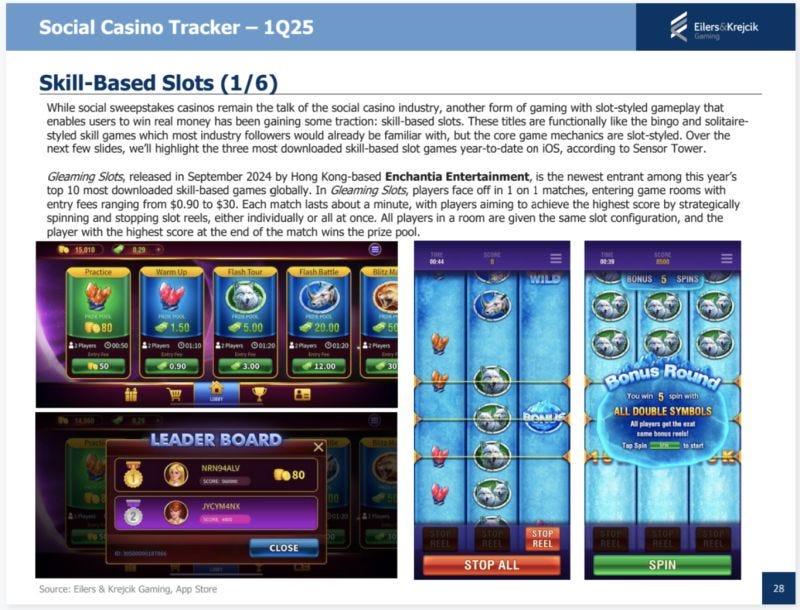The Takeaway: Skill-Based Online Slot Machines For Real Money Are A Thing
Gambling news roundup: Arizona sends a cease-and-desist to Kalshi; the future of AI in gambling; update on Ohio online casino legislation.
Gleaming Slots first came onto my radar because I was getting eleventy billion ads for the app any time I was on Facebook. I am barely exaggerating; it was excessive.
I didn’t think much of it at the time, figuring it was just one of the dozens of sweepstakes casinos that are inundating Facebook with their paid ads. One day, I had seen it so many times, I figured I would try it.
Turns out it’s not at all a sweepstakes, and doesn’t really have any of the same mechanics. It’s just offering a real-money skill game based on the “skill” of stopping slot machine reels; you can play for free coins or for real money.
Even after trying the game, I still didn’t think much of it until I saw this post from Adam Krejcik of Eilers & Krejcik Gaming on LinkedIn talking about skill-based slots. Turns out it’s an entire category with multiple entrants. From Krejcik:
Our Digital & Interactive Gaming team led by Matt Kaufman and Amy Kim just published our "Social Casino Tracker - 1Q25" report, which includes a feature on the emergence of mobile skill-based slot games. Highlights include: Gleaming Slots from Enchantia Entertainment, Fortune Slots from Prisloo Game Studio, and Slots Cash from Bananaz Studios.
I definitely got a laugh out of the line “strategically spinning and stopping slot reels.”
Ifrah Law has been at the center of advancing iGaming in the U.S., shaping groundbreaking legislation, leading precedent-setting cases, and guiding clients that span the iGaming ecosystem through every phase of their business journey. Learn more at IfrahLaw.com.
So is this a legal game of skill? Look, I am not here to tell you that. At the end of the day, it’s in the App Store, like a lot of skill-based games. What I can tell you is it’s the latest example of how far the envelope can be pushed on almost every front in order to get into real-money gaming by avoiding any potential barriers (ie let’s do slot machines but introduce skill.)
Here are some of my observations about the game:
There’s definitely skill involved. If you randomly mashed buttons, you’d do poorly.
The funniest thing about the app is that it misspells “prize” throughout. Is that intentional so they can say they don’t give away prizes? Just no spell checker on staff? They don’t want to risk getting pulled if they do an App Store update? No matter the reason, high comedy.
It’s in the ”board games” section of the App Store, which seems inappropriate. Legal game of skill or not, this is playing a slot machine for money.
It’s routinely in the top 10 for the category and it has almost 30,000 ratings at 4.8 stars out of 5.
If we go by the reviews, assuming they’re not astroturfed, people generally like the game and are getting paid out. There do seem to be a fair number of people who complain about cashouts after their first one is completed.
Some backstory: Video here notes that the game has changed names and developers quite a few times back in the fall, but it seems to be on stable ground now.
You can see from the deposit screen that it’s just a cash model; no sweepstakes dynamic. However, you can get a bonus the more you deposit. Also note that it’s a “deposit,” not a “purchase.”
The game is promoted as player vs. player. But there’s not a whole lot of information about this dynamic. Are the matches synchronous or asynchronous? (It seems like it could be the former from the T&Cs, but it’s not stated explicitly.) At the end of the day, a user is putting a lot of trust into the game developer that these games are being conducted fairly (which, given they can’t spell “prize” correctly, I have some questions about). And, indeed, we’re assuming there are actual real players on the other side of these games.
The advertising for the product on Facebook is highly questionable, which in the grand scheme of things isn’t at all surprising. Here’s the ad that I and many others see all the time. A young woman in a convertible with a kid on her lap who is playing with hundred-dollar bills? The lure of winning thousands of dollars? Yuck.
In any event, as people wring their hands constantly about legal online gambling and some of the other unregulated or quasi-regulated options, here’s something that anyone 18 and older can play with no real regulation or safeguards.
Good luck being a lawmaker or regulator dealing with the gaming industry and all of its adjacencies in the year 2025.
Want to sponsor The Closing Line?
You can email dustin@closinglineconsulting.com for more information.
Gambling news roundup
Arizona Regulators Hit Kalshi With Cease-And-Desist Order As List Grows (InGame): “Add another cease-and-desist order to the wall for Kalshi, Robinhood, and Crypto.com — entities operating prediction markets nationwide — continuing to put the companies at odds with gaming regulators who accuse them of illegally circumventing their rules, regulations, and tax structures. ‘Kalshi is not licensed and its operation of event wagering in Arizona is illegal,’ wrote Douglas Jensen, chief law enforcement officer for the Arizona Department of Gaming (ADG), in a May 21 cease-and-desist order obtained by InGame, which is addressed to Kalshi CEO Tarek Mansour.”
I saw the letter and published most of the content in it over at The Event Horizon.
It’s interesting that the Kalshi win streak in federal court in Nevada and New Jersey didn’t stop a new cease-and-desist, but we’re now up to seven of them. At some point, you also have to wonder if states take a different route — ie going straight to enforcement actions rather than issuing a C&D, since all that is doing is getting states sued by Kalshi.
AI is transforming gambling, but what are the ethical risks? A UF researcher explores (University of Florida): “Though the gambling industry is expected to exceed $876 billion worldwide by 2026, there is a growing concern that unregulated AI systems can exploit vulnerable individuals and profit from them. UF researcher Nasim Binesh, Ph.D., M.B.A., an assistant professor in the UF College of Health & Human Performance’s Department of Tourism, Hospitality & Event Management, is exploring this concern, having recently published a study in the International Journal of Hospitality & Tourism Administration about identifying the risks and ethics of using AI in gambling. Few regulations exist in the U.S. and abroad for AI use and gambling. For example, the U.S. Blueprint for an AI Bill of Rights and the European Union AI Act have sought to govern AI use, but they are not industry-specific. More recently, in March, the International Gaming Standards Association’s Ethical AI Standards Committee, responsible for ensuring that the use of AI in gaming is fair, announced that it would begin developing a best practices framework to help gambling regulators better understand AI’s role in the industry. ‘AI systems, which are designed to optimize profit, could identify and target players susceptible to addiction, pushing them deeper into harmful behaviors,’ said Binesh, who co-authored the study with Kasra Ghaharian, Ph.D., the director of research for the University of Nevada, Las Vegas International Gaming Institute.”
R.I. must lower taxes to attract DraftKings, FanDuel, report finds (Boston Globe, paywall): “A new study of the sports betting market in Rhode Island recommends that the state allow more companies to offer online wagering – think DraftKings or FanDuel – but it warns that the major companies might not be interested in the state without changes to state law or the constitution.
The report, prepared for the Rhode Island Lottery by Spectrum Gaming Group, found that Rhode Island ‘has the highest effective tax rate in the country for sports wagering’ at 51 percent, and IGT and its Sportsbook Rhode Island app currently have the exclusive rights as an online provider.”
Ohio iGaming Contingencies Concerned With Proposed License Fee, Tax Rate (Sports Betting Dime): “Proponents of legalized Ohio online casinos praised portions of Sen. Nathan Manning’s (R-13) iGaming bill, SB 197, while also sharing concerns with several key aspects of the proposed law during its second hearing in the Senate Select Committee on Gaming. Namely, testifiers shared concerns with what they believe is an overly expensive license fee, a high iGaming tax rate, and too few iGaming skins. ‘The fee structure in this bill today would be the highest in the entire country,’ Ryan Soultz, VP of Governmental Affairs at Boyd Gaming, said during the hearing.
Sweepstakes advertising at The Washington Post: I am on WaPo’s email list, and I thought it was interesting to note that sweepstakes poker site Global Poker was the lead sponsor of one of their newsletters. It’s not the first newsletter I’ve seen with Global doing this; I’ve also seen it in the Sun Sentinel serving South Florida. WaPo has of course tackled the subject of sweepstakes casinos and sportsbooks in the past.
Pennsylvania men lost hundreds of thousands gambling on DraftKings. Now they're suing (Go Erie): “Five Pennsylvania men are trying to launch a class action lawsuit against DraftKings, the online sports betting behemoth that they say used predatory tactics and deceptive marketing to fuel their gambling addictions. The federal lawsuit claims that, instead of trying to help people in the throes of compulsive gambling, DraftKings targets and exploits these individuals. The company also extends promotional deals that offer ‘no sweat’ bets or deposit matches, while hiding convoluted conditions in the fine print, according to the lawsuit.”
Court rejects DraftKings’ appeal bid in MLB players’ lawsuit (Next.io): “MLB Players Inc (MLBPI) is suing DraftKings for misappropriation of publicity and unjust enrichment, claiming the company used players’ identities without permission on its online sportsbook platforms and social media posts. … However, in a memorandum issued yesterday (21 May), Judge Marston rejected all four proposed questions for certification, dealing a significant blow to DraftKings’ legal strategy.”
If Meadowlands gets a casino, it needs key amenities to compete with online gambling (North Jersey): “The Meadowlands and Monmouth Park race tracks — the potential locations for future brick and mortar casinos — would need to provide many new amenities and luxury offerings to stay afloat in the era of online gambling, analysts and industry executives told NorthJersey.com.”
From Gambling to Garbage, Coal Country Mines for the Next Big Thing (NYT): “When Clyde Stacy bought the Bristol Mall in 2018, both the mall and the surrounding coal country of Southwest Virginia were in trouble. The mall, once the marquee shopping destination in the region, had become vacant, weeds punching up through its parking lot. And the city of Bristol, the self-described birthplace of country music, was buckling under the weight of more than $100 million in debt, forcing budget cuts to its schools. Nearby, mining counties across Virginia’s slice of Appalachia were reeling after decades of job loss. Mr. Stacy and his friend Jim McGlothlin, both former coal magnates, seized on what they called a “moonshot” solution: turning the mall into a casino, in a state where gambling was not yet legal. Today, the Hard Rock Hotel & Casino Bristol has become an unlikely beacon of hope. It employs 1,400 workers and has sent tax revenue rippling through the surrounding coal country where the men made their first millions.”












